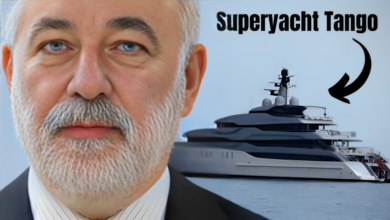SuperMarkert DIA in Spain run by Powerful Mikhail Fridman 2024
Mikhail Fridman, a Russian billionaire and co-founder of Letter One Investment Holdings SA (LIHS), holds a considerable share in Dia, a Spanish supermarket chain. A photo of Dia can be found on Marina Zarate GR/Wikimedia Commons under the Creative Commons Attribution-Share Alike 4.0 International license. Despite being an oligarch and a multi-billionaire, Fridman has chosen not to publicly address the outcome of DIA. A photo of Fridman can be found on LetterOne Group/Wikimedia Commons under the Creative Commons Attribution 2.0 Generic license.
LIHS (Letter One Investment Holdings SA), which was co-founded by Russian billionaire Mikhail Fridman, holds a considerable share in the Spanish grocery store Dia. However, Dia maintains that it is not under the direct control of Fridman or any single shareholder.

Dia asserts that despite Fridman being added to the European Union’s sanctions blacklist for Russia’s actions in Ukraine, it will not be impacted by these events.
In 1964, Fridman was born into a Jewish household in Lviv, a city located in western Ukraine. He received his education in Moscow and later established a comprehensive business empire that covered various industries such as oil and gas, banking, telecommunications, and distribution. Currently, he splits his time between London and Moscow and according to Forbes, his wealth is estimated to be $15.5 billion.
According to The Times of Israel, despite his close relationship with Putin’s administration, he has never been included in the president’s inner circle. This highlights the intricacies of Fridman’s role as a businessperson who has connections to both Russia and the global community. In light of recent events in Ukraine, Fridman has made a plea for an end to the violence, further highlighting the complexity of his position.
SuperMarkert DIA
In 2019, Fridman’s investment firm, LIHS, acquired a controlling stake in DIA following a two-year struggle. According to the Spanish business magazine Olive Press, LIHS currently holds 78% of the company’s shares. This was preceded by LIHS’s initial investment in Dia in 2017, which was followed by a hostile takeover attempt after two years.
LetterOne first bought into Dia in 2017, launching a hostile takeover bid two years later.
The Spanish chain, which operates nearly 6,000 supermarkets in Spain, Portugal, Argentina and Brazil, posted a turnover of 6.64 billion euros ($7.4 billion) last year, the group said on Tuesday, giving a net loss figure of 257.3 million euros ($287 million).
Grupo Dia reported a decrease of 75.6% in net losses, amounting to US$32 million in 2023, compared to the previous year. This outcome is primarily due to the devaluation of assets in Brazil. The company is currently reviewing its options to withdraw from Brazil as the business in Rio has had a detrimental effect on its annual financial statements. However, Grupo Dia remains optimistic about returning to profitability by 2024.
According to CEO Martin Tolcachir’s press release, the Spanish grocery retailer, achieved positive results in its 2023 fiscal year by implementing a successful proximity strategy, even in the face of a difficult economic environment.
Under our single banner, we have successfully achieved our strategic priorities, streamlined our portfolio, and prepared for future growth.
Dia’s financial director, Guillaume Gras, emphasized the positive strides made in debt reduction. He also stated that their strong performance and efforts to reduce debt have given them the confidence to approach the upcoming refinancing process with optimism.
Approximately 62% of the stores in Dia’s main markets, namely Spain, Argentina, and Brazil, operate under franchise agreements. These franchisees contribute to 45% of the company’s net sales, which has seen a growth of 6.4% since 2022.
According to a press release from the company, private labels made up 54% of the shopping basket in Spain in 2022, an increase from 52.6%. In Argentina, they accounted for 29%.
Sources: Olive Express, The Times of Israel, The Economist, and DIA.








